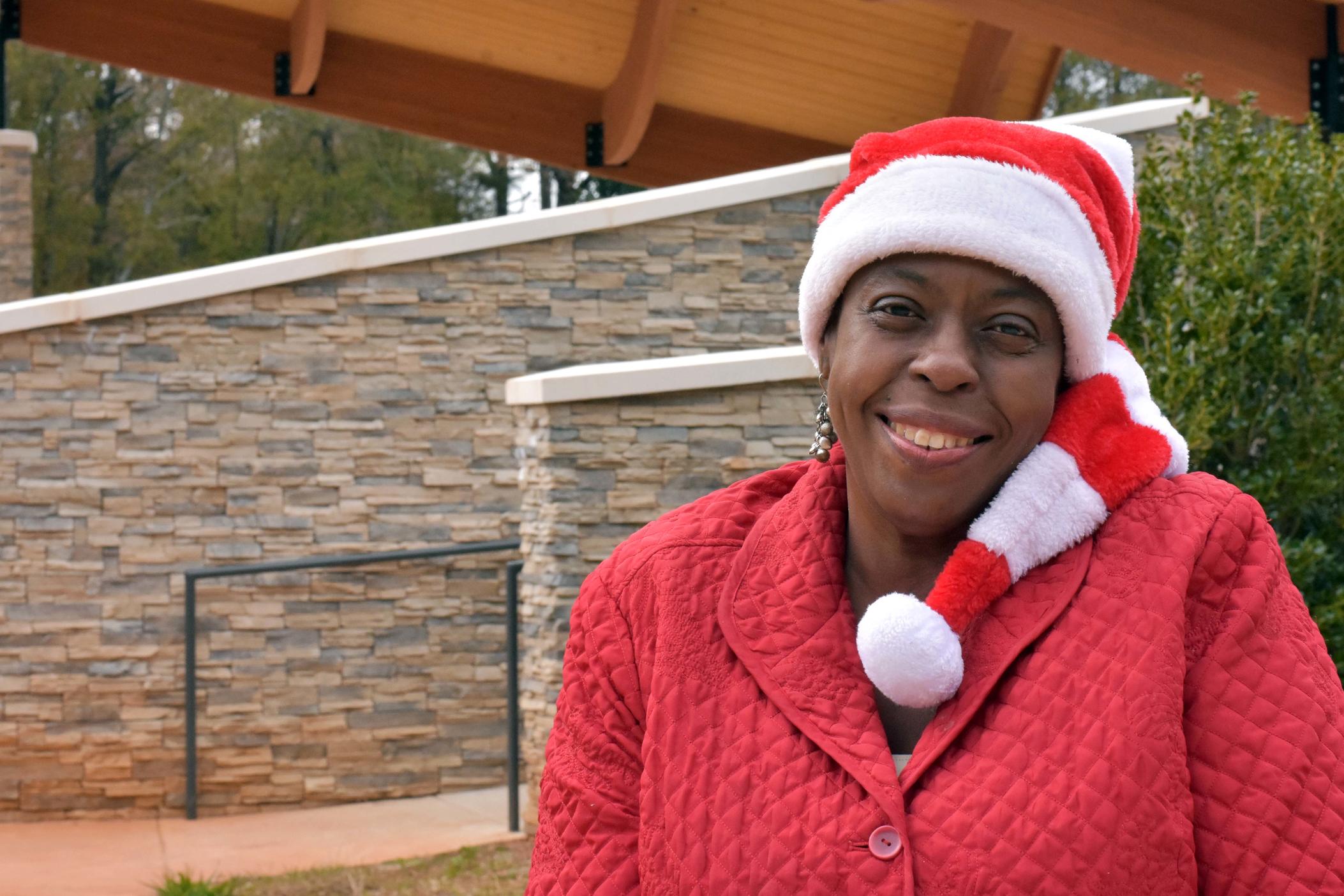Section Branding
Header Content
Battleground: Ballot Box | A conversation with McDonough's new mayor
Primary Content
They say all politics is local, and nowhere is that more true than with a city’s mayor.
Part cheerleader, part referee and part day-to-day manager of all things government, it’s an often underappreciated gig that has a big impact on a lot of our daily lives. And while a lot of people may be talking about the Atlanta mayor’s race or next year’s midterm elections, there were other elections this past November that marked substantial shifts in local government around the state.
One of those was just south of Atlanta in McDonough, a city of about 30,000 that has grown nearly 30% in the past decade. McDonough is the county seat of Henry County — which is considered one of the fastest-growing counties in the country and a pivotal player in Georgia’s shift to a battleground state.
But for mayor-elect Sandra Vincent, the first woman and African American to hold that role, McDonough is home.
"Our current mayor refers to McDonough as the new promised land, and I believe that about our city," she said. "And I’m looking forward to taking us to the next level of that promised land."
It’s also the city where I grew up, and has played a big role in shaping my perspectives and how I approach reporting on politics.
This week, we will take a look at what one city’s past, present and future can tell us about a changing Georgia.
I met Vincent on a chilly November Sunday in Alexander Park West, a relatively new park with a walking trail, a disc golf course and a bandstand — all part of a larger effort to eventually add dozens of acres of green space just off the square.
Wearing a Santa Hat and painting a red-and-green house facade that will serve as a backdrop for a community Christmas toy drive, Vincent stopped to talk about why she ran for mayor after serving on the McDonough City Council for 16 years.
Growing up in Florida, her great-grandmother was a community leader that everyone called “Mama.”
"In fact, it's a little bit funny because this is Christmas season, and during the Christmas season, I dress as a character called Mama Christmas," Vincent said. "And she is sort of the embodiment of the memory of my great-grandmother."
That memory helps drive her passion for public service serving in the burgeoning city.
The latest Census numbers show the population inside the city limits has grown from 22,084 people to 29,051 — driven almost exclusively by a surge in Black residents. And yet Vincent is the first Black mayor, something she doesn’t take lightly.
"I have to consider that an honor to be chosen for that role," she said. "But I'm also looking forward to the day when the first are all gone and and that we don't have to announce that certain races, certain genders are the first at anything."
McDonough is a lot like smaller cities across Georgia, centered around an idyllic square with a courthouse, mom-and-pop restaurants and fashionable boutiques. The area is marketed as "comfortably south" of Atlanta, and Vincent said what drew her to move there were the people.
"The thing that drew me was the hospitality," she said. "I've always felt welcomed." Our current mayor refers to McDonough as the new Promised Land. And I believe that about our city. And I'm looking forward to taking us to the next level of that promise in my life."
But welcoming growth in McDonough has not been universal: parts of the surrounding community have seen investment as Georgia's economy has grown, while others have been left behind. And then there’s the traffic, especially on I-75 through McDonough, going both directions, most every day.
"I think that the traffic problem that we're having is an indicator that we didn't always do it right," Vincent said about city planning. "But part of that was just trying to keep that that small-town feel. Changes that I've seen, in some regard, have been good, but that core element that I don't want McDonough to ever lose is that sense of of community."
And in a state that is projected to soon be majority non-white and recently voted Democratic statewide for the first time in two decades, that change in community has come with some friction. But Vincent has a plan for that.
"The one thing that I've seen sorely missing is intentional integration, and what I mean by that is that groups don't get left behind," she said. "Sometimes you have to go and get those groups, and welcome and bring them to the table. The more that we talk together, we play together, we interact with one another, the easier the change will will be."
I’ve witnessed the change firsthand with my own family, growing up just outside the city limits. When my father graduated from Henry County High School about 30 years ago, there were probably 40,000 people in the whole county.
It was mostly rural farmland, solidly Republican and overwhelmingly white.
By the time I graduated high school in 2012, subdivisions were being built in open fields I used to pass on the way to church, elections were more closely contested and the area touted as “comfortably south” of Atlanta was starting to see an influx of jobs and job-seekers that would rapidly transform the area.
It’s a place that was a little more reflective of Georgia as a whole, with racial and political diversity coupled with economic growth, giving a preview of where our state is headed today.
Now, it’s majority Democratic, majority Black and quickly becoming upper middle class suburbia. But as the incoming mayor, Vincent doesn’t want anyone to feel like they’re being left behind in the process.
"If you want your community to be a whole community — with people working together and living together — then that's just how you have to approach the office and you have to do those things that are going to bring your community together," she said.
That includes things like more public spaces, parks, and other places where people can congregate.
"Here's my Southern charm and upbringing coming out: It gives us a front porch," Vincent said. "You know, it gives us a place to come together and see the world from our front porch."
That front porch feeling might be a little harder to find these days, with polarization and bitterness in politics working its way down to even the smallest of races. Though the mayor of McDonough is a nonpartisan election, Vincent said there was partisan misinformation and baseless attacks that she spent a lot of time tackling to make sure people actually knew where she stood.
Those were important moments for her, especially because of the desire she had to run for mayor to take a more active role in making sure change coming to the city wouldn’t change who the city was for.
"My desire to be mayor really came from this place where I felt like the direction that we were headed in was not really the direction that we should be going," she said. "There were a lot of new changes that was shifting into just kind of moving with the development of what was happening around us instead of guiding that development."
She considers the role of a mayor to be a catalyst to make changes and oversee decisions that benefit everyone, and says everyone who lives in McDonough — or anywhere, for that matter — ultimately wants some of the same things from their local government: open spaces, parks and quality of life.
So there’s been both public and private improvements in McDonough and Henry County over the last few years to retain that small-town charm but make it a welcoming place and thriving city.
The square has become a focal point, with new shopping and dining and places like The Neighborhood Lot, a row of old parking spaces converted into a restaurant/bar/hangout spot that Vincent calls "delicious," and the park where she sits building a Christmas village.
It may seem cliche or even out-of-touch to talk about the importance of a place you can sit and meet a new neighbor in a quaint coffee shop or on the trails of a park, but Vincent has a vision of bringing the "local" back to local politics that she says can be replicated anywhere.
"And I think any community, regardless of where you are — the best part of where you are is tied to those types of exchanges and it's tied to just people loving on one another," she said. "And that, to me, is portable. That is what I grew up with. That's what I've experienced in McDonough, and I'm looking forward to seeing that energy grow and how it will transform the community into a greater space."
Of course, there’s always going to be talk of taxes, schools and road improvements and other government goings-on, and Sandra Vincent is focused on that, too.
But her vision of success in this changing Georgia is more of a feeling than a factoid on a spreadsheet.
"Success will look like a community that looked better than it did when I found it," she said. "It's a community that really knows how to find resources when they need resources, and that they really just kind of understand that the McDonough way — the McDonough heart is a helping heart and it's a coming together of folks. And if McDonough looks like that, I will have been successful."
Next week on the podcast, we take a look at the multitude of lawsuits likely to dominate state politics, from elections to vaccine mandates to the expected challenges to redistricting.
Battleground: Ballot Box is a production of Georgia Public Broadcasting. Our producer is Jess Mador, our editor this week is Josephine Bennett. Our engineer is Jesse Nighswonger, who also wrote our theme music. You can subscribe to the show on Apple Podcasts or anywhere you get podcasts. Thanks for listening.



